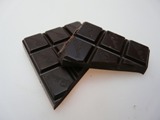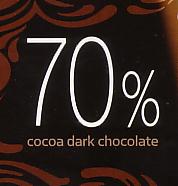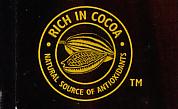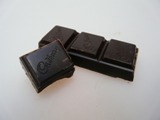- Home
- Blog
- Healthy Eating for Wellness
- Dark chocolate - health food or guiltless treat?
Dark chocolate - health food or guiltless treat?
Written by Catherine Saxelby
on Thursday, 12 August 2010.
Tagged: antioxidants, chocolate, cravings, dieting, diets, fat, food labels, healthy eating, portion size, snacks, sugar, super foods

Chocolate, with its comforting velvety smoothness, is everyone's favourite indulgence. We love each new study on its alleged health benefits which give us the green light to indulge. But what's the truth: can we now say that it's a guiltless super food packed with antioxidants or just an indulgence with great marketing?
First the good news on chocolate's polyphenols
- Cocoa and dark chocolate have been found to be abundant in a class of antioxidants known as oligomeric procyanidins (OPCs). You'll also see these referred to as flavonols or polyphenols (which is the general term for this whole class of related antioxidants including those found in tea and red wine).
- Research shows that chocolate's flavonols are platelet inhibitors which have a mild anti-coagulation effect which means they can keep your blood free-flowing and reduce your chances of developing an artery-blocking clot.
- Flavonols may improve endothelial function (so keeping your arteries elastic), reduce inflammation, lower your blood pressure, prevent cholesterol from being oxidised and even possibly prevent cancer. In chocolate itself, these clever flavonols work to protect chocolate from turning rancid, even without refrigeration.
- Taken together, these properties could reduce your risk of heart attack and stroke. But all the positive studies have been short-term in only a small number of volunteers and often sponsored by the chocolate manufacturers. So it's still early days.
- Thanks to its cocoa solids from cocoa beans, chocolate also contains small quantities of B vitamins and the minerals potassium, phosphorus and calcium (especially from milk chocolate) and copper. But remember that the levels are small. You'll get more of these essential minerals from vegetables, fruit and dairy foods for fewer kilojoules/Calories.
Now for the bad news on chocolate
 Antioxidants aside, chocolate remains a rich concentrated food that packs a lot of kilojoules/Calories into a small space.
Antioxidants aside, chocolate remains a rich concentrated food that packs a lot of kilojoules/Calories into a small space.
Chocolate, whether dark, milk or white, is rich and fattening. With roughly one-third fat and half sugar, it's a very concentrated food. Few foods that come close to this "kilojoule density". That's precisely why bushwalkers and mountaineers make use of chocolate in their packs and soldiers are always supplied some as part of army survival rations.
Don't believe me?
- Take the average 50 gram bar of chocolate. The bar slaps on 15 g of fat plus 25 g sugar which tote up some 1107 kilojoules (264 Calories).
- Compare that 50 g bar to 50 g of grilled steak (often thought of as ‘fattening'). You'll see the steak supplies a mere 410 kilojoules (98 Calories) with is less than half the same weight of chocolate.
- And how about hot potato chips? A small tub of 50 g of fried potato chips also takes things off, it only adds to body fat.
Anyone who's had a chocolate craving can testify that chocolate is all too easy to overconsume (who ever stops at just one piece?). Recent Dutch research into twin-packs (the industry's efforts to downsize) has shown what we know - people eat both bars on the one day and can't restrain themselves to keep the second one for another day. Sad but true!
Guiltless fat?
However all is not lost. Even though the fat in chocolate is mainly saturated (the bad type of fat that raises cholesterol), much of this saturated fat is in the form of stearic acid, which has little effect on blood cholesterol. So if you need to follow a `heart healthy' diet, chocolate isn't the worst thing to treat yourself. You can happily eat a small piece in moderation.
Dark or milk?
The type of chocolate is the key. This research applies to the bitter not-so sweet dark chocolate (where the level of cocoa solids is high from 40 to 85%). It doesn't apply to the popular milk chocolate with only 25 per cent cocoa solids. White chocolate with no cocoa solids has no health benefit.
There's also a suggestion that the milk may actually interfere with the absorption of the antioxidants into the body but no-one is sure of this at this point.
What to buy
 Buy dark chocolate where the first listed ingredient is "cocoa mass", not sugar, and where there's 70 per cent cocoa solids or higher.
Buy dark chocolate where the first listed ingredient is "cocoa mass", not sugar, and where there's 70 per cent cocoa solids or higher.
This gives you a higher concentration of cocoa liquor, the original cocoa bean extract with more of the bean ‘goodies'.
 Some manufacturers have modified their dark chocolate so it's less bitter with slightly lower cocoa solids but still high in the important flavonoids eg Dove Dark Promises (made with the Cocoapro process), Nestle Club.
Some manufacturers have modified their dark chocolate so it's less bitter with slightly lower cocoa solids but still high in the important flavonoids eg Dove Dark Promises (made with the Cocoapro process), Nestle Club.
If there's some sort of claim on the label e.g. "source of antioxidants" or an amount of polyphenols listed in the nutrient panel, it's a good choice.
The bottom line
 Much as we hate to hear it, there are less rich, more healthy ways to get your antioxidants. Chocolate is never going to make it as a food group alongside vegetables, fruit and whole grains. Small doses, say a 20 gram piece or 4 squares or a fun-size individual bar a day, as part of a healthy diet, still seems the wisest option.
Much as we hate to hear it, there are less rich, more healthy ways to get your antioxidants. Chocolate is never going to make it as a food group alongside vegetables, fruit and whole grains. Small doses, say a 20 gram piece or 4 squares or a fun-size individual bar a day, as part of a healthy diet, still seems the wisest option.
You may also be interested in...
Foodwatch
The Good Stuff
The Boring Stuff
© 2025 Foodwatch Australia. All rights reserved
Website by Joomstore eCommerce





